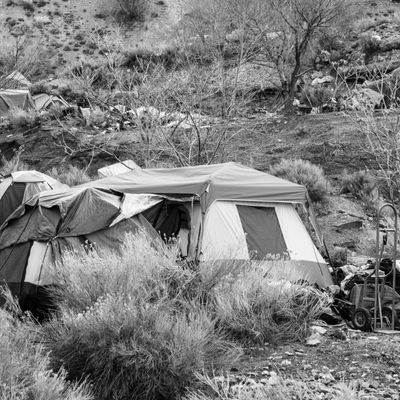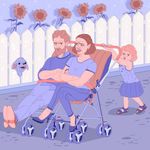
On Monday, the Supreme Court hears oral arguments in Grants Pass v. Johnson, a case that will decide whether cities across the country can treat existing while homeless as a criminal offense. A group of the unhoused residents of Grants Pass, Oregon, sued the city in 2018, arguing that it uses aggressive anti-camping ordinances to “run homeless people out of town.” Police can issue steep fines — $295 per ticket, as a baseline — to unhoused people for sleeping or using bedding in parks and other public spaces. At the same time, Grants Pass has no low-barrier shelters where people can sleep. It only has a sex-segregated Christian mission with strict rules, including requirements that entrants “dress and behave according to their birth gender,” attend its church services, and abstain from substance use. The city offers the unhoused nowhere else to go when it kicks them off public property — a policy the plaintiffs in the lawsuit view as cruel and unusual punishment, because it penalizes them for their status as homeless rather than for any particular act. After two lower courts agreed, Grants Pass appealed to the Supreme Court, arguing that the rulings prevent officials from “proactively addressing the serious social policy problems associated with the homelessness crisis.”
Helen Cruz, 49, has lived in Grants Pass for four decades and became unhoused in 2016. Although she was able to move into a church last year, she says she still has several thousand dollars in unpaid municipal fines — a sum that makes it impossible for her to put down a deposit on her own rental or pass a credit check.
When I first became unhoused, I was sleeping on the railroad tracks, in bushes here and there, before I set up camp on a mountain. Being homeless in Grants Pass is an absolute nightmare. In the winter, it has to get down to 30 degrees before they will even think about opening any kind of warming center. We have one mission and we have what’s supposed to be transitional housing, little tiny houses, but there’s only six of those. Once, I called an emergency line and said I was homeless. They could not find one resource for me. I hung up the phone and just started crying.
I was holding down two jobs at the time, working in a motel and cleaning houses, but it was a pretty treacherous hike every day. So I decided to move off the mountain into one of the parks in town. You’re not allowed to stay more than 72 hours. If you don’t move along, then you can be fined, and ultimately, put in jail. If you don’t have a vehicle, you can’t move your things, unless you’re very limited in terms of personal belongings. It takes at least one whole day to move, every three days. It’s exhausting. It was also a daunting task to be clean, to be presentable, to be up and ready for work. Sometimes I’d do laundry in the river, but there are no resources for showers. I’ve lived here all my life, so I have a lot of friends and I could impose on them for a shower every once in a while. But that’s an uncomfortable feeling. I ultimately lost one of my jobs; I just couldn’t manage two of them and still comply with the 72-hour rule.
The police would approach us basically every single day. You hear ’em coming down the path at seven o’clock in the morning. “Helen, we know you’re in there, you gotta drop your tent! You gotta move!” They tell you your tent is for sleeping only. They would pull up the stakes and tell us they could give us a ticket because we were ruining their parks, killing their grass. They’ll give you tickets for scattering rubbish, smoking too close to the playground, having a tent that’s above a certain height. Camping in the park is $300. Scattering rubbish is $95. Smoking is another $75. You can’t have your tent too close to a fence, you can’t have it too close to a pathway — you can get ticketed for that as well. If you get two tickets in one park, then you get excluded from that park for 30 days.
One day, I was just fed up with it. I got two tickets, for scattering rubbish and camping in the park. When I read the bottom of the exclusion order, it said that I could appeal, so I went to the free law center and I got some information. Then I went to the City Council and asked for the paperwork. They all looked at me like I was dumb. They didn’t know what I was talking about. I had to write my own appeal for my park exclusion. But my right to due process was clearly violated, because I didn’t have my day in court before I had to leave the park. I was not allowed back for 30 days. If I had set foot in that park, they would’ve taken me to jail.
When you get a ticket, you can go in front of a judge. The fines don’t get dropped, but they’ll lower them if you lose. If you don’t fight them, they just send the fines straight to collection. But when you leave your tent, the police will throw it in the garbage. One day, I was taking this minor charge to trial. The police knew I was going to court. They came while my boyfriend was in the tent with my two dogs and they told him he had to get out. They rolled my tent up like a burrito, put it in the back of a pickup truck, took it to the police station, and told me I could get it there. I told my attorney, “I don’t care, take a deal. They just swept my camp. They took everything I own.”
When I got to the police station, the same truck pulled in and dumped my tent right there in the parking lot like it was nothing. They had no concern for any of my belongings. My tent poles were broken. I had a small ice chest in the tent and they didn’t even care, they just dragged it down the sidewalk like a sack of potatoes. My bedding, my blankets, my court papers, my photo albums — everything was soaked.
Why are you trying to beat down somebody who has nothing? You’re just deterring them from ever trying to come up in the world and be self-sufficient. You can’t get a place of your own unless you make three times the amount of rent and have a good credit score. My credit’s bad because of these tickets. Just recently, I started to build my own business — I’m a professional house cleaner. I want to expand, so I filed for business loans and got denied.
In Grants Pass, the homeless are shunned. The community here is very disapproving — we’re a problem, we’re just bottom-feeders. It’s demeaning. It puts a huge damper on my self-esteem. We deserve the same rights as everybody else. Bottom line: We need a place to go.
Correction: A previous version of this story incorrectly stated Helen Cruz’s connection to the Supreme Court case. She is an advocate.





